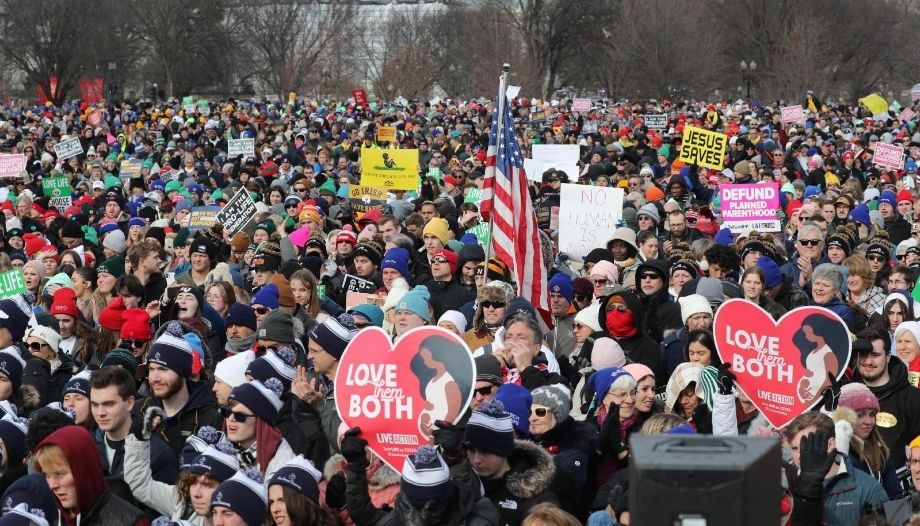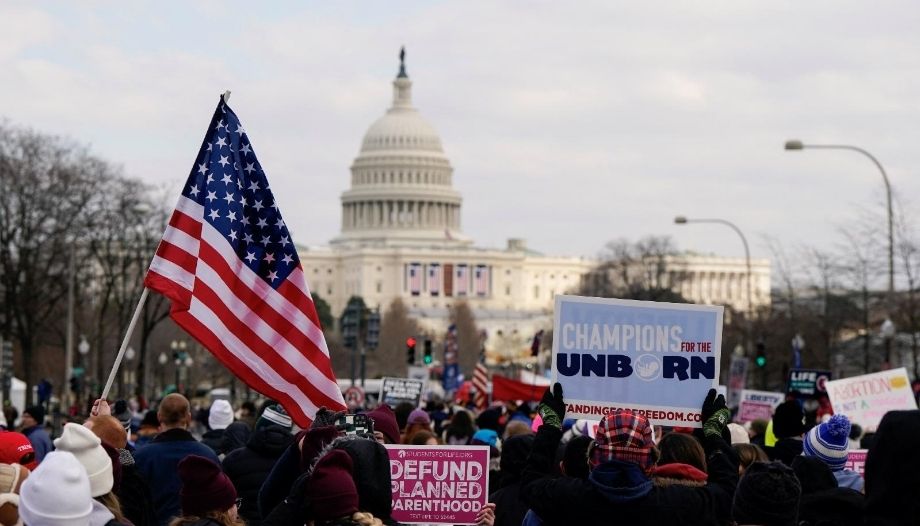"Let me say very simply: I want more babies in the United States of America," Vice President JD Vance told an ecstatic crowd at the 52nd Annual 52 National March for Life this Friday, January 24.
"I want more happy children in our country, and I want beautiful young men and women who are eager to welcome them into the world and eager to raise them," he said. "And it's our government's job to make it easier for young mothers and fathers to afford to have children, to bring them into the world and to welcome them as the blessings that we know they are, here at the March for Life."
Some speakers
In his first public appearance after Inauguration Day, Vance was the final speaker at the annual two-hour rally that preceded the attendees' walk from the grounds of the Washington Monument to the U.S. Supreme Court building.
Other speakers included Florida Governor Ron DeSantis, Senate Majority Leader John Thune, R-South Dakota, and House Speaker Mike Johnson, R-Hague. This is the first time both Congressional House leaders have attended a March for Life.
While most of the speakers - politicians and pro-life advocates - spoke specifically of making abortion "illegal and unthinkable" in post-Dobbs America, Vance championed a pro-family vision that not only rejected abortion, but also supported parenting.
Defense of the unborn, and in favor of the family.
Referring to his three young children, Vance, who is Catholic, said, "The task of our movement is to protect innocent life. It is to defend the unborn; and it is also to be pro-family and pro-life in the broadest possible sense of that word."
As in previous years, the march drew tens of thousands of people, many of them young people. Some traveled more than a day by bus, skipping classes at high schools and colleges to join others along the National Mall in the cold Atlantic. They carried signs reading "Love them both," "Life is our revolution" and "Defund Planned Parenthood," America's largest abortion provider.

The 2025 march also commemorated a change in the leadership of the event's organization, since its long-time chairwoman, Jeanne ManciniThe president of the March for Life, who is now the incoming president, gave up her seat to the incoming president of the March for Life, Jennie Bradley Lichter. Mancini was the presenter of the 2025 march, and both took the floor, while Bradley Lichter introduced Vance.
Changing abortion landscape
The march was founded to protest against Roe v. Wade, the 1973 Supreme Court decision that legalized abortion in all 50 states. That decision was overturned in 2022 with the failure court's decision in Dobbs v. Jackson Women's Health Organization, thus returning abortion policy to lawmakers. At the rally, leaders of the March for Life addressed the march's role in the changing abortion landscape, with laws which now vary widely from state to state. The march, they insisted, must continue.
"Today we affirm that the pro-life generation will not rest until every single abortion facility in our country closes its doors forever. We will march until every child is protected by federal law, until abortion is unthinkable, and until every pregnant woman receives excellent prenatal care," said Hannah Lape, president of Wheaton College Voice for Life. Her group carried the iconic 2025 march banner.
Crisis of fundamental human rights
"With the new administration and the drop of Roe v. Wade, the next four years of American history will be defined by courage or cowardice," he said. "Abortion is not a state's rights issue to be ignored. It is a fundamental human rights crisis that weighs on America's shoulders. Our country cannot be great until preborns are protected, and they are protected (with) the right to life."
Trump's campaign statements
The march took place four days after President Donald Trump was sworn in for his second term, following a campaign that disappointed many pro-life advocates in some respects. Trump was hailed for his pro-life actions during his first term. He has since backtracked on his support for a federal ban on abortion, stating that he believes U.S. states should determine their own abortion laws.
He also posted positive comments on social networks about "reproductive rights," and indicated that he would not restrict access to the mifepristone. The drug, although prescribed in some spontaneous abortion care protocols, is widely used for nearly two-thirds of abortions in the United States.
How Trump's campaign statements on abortion will affect policymaking remains to be seen. But many pro-life leaders seem optimistic about the new administration.
Pardon for 23 pro-life activists
Day before the March for Life, Trump pardons 23 activists pro-life convicted of violating the federal Freedom of Access to Clinic Care Act (FACE). The activistsmany of whom Trump said were elderly, had been convicted of blocking access to abortion clinics. An executive order on gender that Trump issued earlier in the week also defined life as beginning at conception, a point that House Speaker Johnson made at the march rally.
Johnson was one of the House members who passed the Born-Alive Abortion Survivors Protection Act on Jan. 23, a day after Democrats blocked a similar bill in the Senate.
President's video in favor of family and life
In a video played at the march, Trump touted his pro-life record and said that in his second term "we will again proudly stand up for families and life."
"We will protect the historic gains we have made and stop the radical Democratic push for a federal right to unlimited abortion on demand, up to the moment of birth and even after birth," he said.
A survey of the Knights of Columbus
A majority of Americans support some legal limits on abortion while keeping the practice largely intact, according to a Knights of Columbus-Marist poll released Jan. 23. The annual survey found that 83 % of Americans support pregnancy resource centers and 67 % of Americans support some legal limits on abortion.
But 60 % supports limiting abortions to the first three months of pregnancy, a limit that would leave most abortions legal, since nine out of 10 abortions occur in the first trimester.
"Science is on our side."
"All of you here, all of you, have the power to change minds," Lila Rose, a Catholic and longtime pro-life advocate, told the crowd. "You are the voice of the voiceless. Remember that science is on our side. Truth is on our side. We simply must have the courage to speak the truth with love."
Two previous events
The March for Life was preceded by two large-scale events: Life Fest 2025 at the EagleBank Arena in Fairfax, Virginia, held the day before and the morning of the march; and the National Prayer Vigil for Life at the Basilica of the National Shrine of the Immaculate Conception in Washington.
The Sisters of Life, the Knights of Columbus and the Diocese of Arlington, Virginia, teamed up to present the two-day Life Fest event, which drew nearly 8,000 people. At the national shrine, Archbishop Joseph F. Naumann of Kansas City, Kansas, was the main celebrant with homily at the opening Mass of the prayer vigil on Jan. 23. And Bishop Robert J. Brennan of Brooklyn, New York, was the principal celebrant at the closing liturgy on January 24. Archbishop Naumann also delivered an opening prayer at the March for Life.
"We are not the ones to decide whether he lives or not."
Marcela Rojas, who lives in the Archdiocese of New York, said she attended the march with a group of 75 people, many of them mothers carrying their young children. "Inside our being, in our womb, there is a life," she said referring to pregnant mothers. "It is a life that we cannot choose for. It is already another life that does not belong to us, and we are not the ones to decide whether it lives or not."








